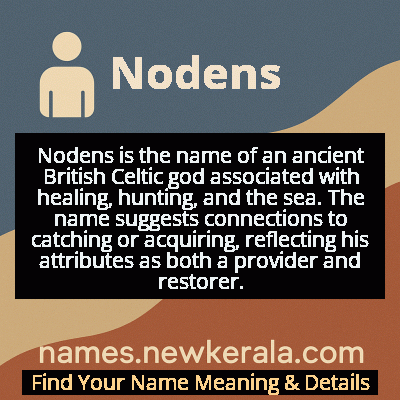Nodens Name Meaning & Details
Origin, Popularity, Numerology Analysis & Name Meaning of Nodens
Discover the origin, meaning, and cultural significance of the name NODENS. Delve into its historical roots and explore the lasting impact it has had on communities and traditions.
Name
Nodens
Gender
Male
Origin
Anglo
Lucky Number
8
Meaning of the Name - Nodens
Nodens is the name of an ancient British Celtic god associated with healing, hunting, and the sea. The name suggests connections to catching or acquiring, reflecting his attributes as both a provider and restorer.
Nodens - Complete Numerology Analysis
Your Numerology Number
Based on Pythagorean Numerology System
Ruling Planet
Saturn
Positive Nature
Ambitious, efficient, realistic, and authoritative.
Negative Traits
Materialistic, stressed, confrontational, and can be overly ambitious.
Lucky Colours
Dark blue, black.
Lucky Days
Saturday.
Lucky Stones
Blue sapphire, amethyst.
Harmony Numbers
2, 4, 6.
Best Suited Professions
Business leaders, managers, financial services, law enforcement.
What People Like About You
Leadership, determination, organizational skills.
Famous People Named Nodens
Nodens of Lydney
Celtic Deity
Primary deity worshipped at the Lydney Park temple complex in Gloucestershire
Nodens the Healer
Mythological Figure
Revered as a divine healer whose cult center attracted pilgrims seeking cures
Nodens the Hunter
Mythological Figure
Associated with hunting and depicted with hunting dogs and marine imagery
Name Variations & International Equivalents
Click on blue names to explore their detailed meanings. Gray names with will be available soon.
Cultural & Historical Significance
The deity's associations with hunting, dogs, and the sea reflect the importance of these elements in Celtic life and cosmology. His identification with Irish Nuada and Welsh Nudd/Lludd shows the pan-Celtic nature of certain divine figures and their adaptation in different regional contexts. The survival of his worship into the 4th century AD, as Christianity was spreading through the Roman Empire, indicates the enduring power of indigenous religious traditions. Nodens thus stands as a significant figure for understanding cultural continuity and change in Britain during the Roman period and the complex interplay between native and imported religious practices.
Extended Personality Analysis
Nodens embodies the archetype of the compassionate healer combined with the formidable hunter, creating a complex divine personality that addresses both human vulnerability and strength. As a healing deity, he demonstrates profound empathy and mercy, offering solace and restoration to those suffering from physical ailments. This healing aspect suggests a personality characterized by patience, wisdom, and the ability to transform suffering into wholeness. The organized nature of his worship, with dedicated temples and ritual practices, indicates a deity who inspires disciplined devotion and structured spiritual practice.
Simultaneously, his hunting associations reveal a more aggressive, protective aspect—a deity who actively pursues goals and provides for his followers. This duality suggests a balanced personality capable of both gentle care and determined action. The marine imagery connected to Nodens adds another dimension, implying a personality with depth, mystery, and connection to the unconscious or unknown realms. His enduring worship across centuries indicates a consistently reliable and accessible divine presence in the Celtic spiritual landscape, one that maintained relevance by addressing fundamental human needs for health, protection, and connection to the natural world.
Modern Usage & Popularity
In contemporary contexts, Nodens appears primarily in academic, pagan revivalist, and creative spheres rather than as a common personal name. Scholars of Celtic studies and Romano-British archaeology frequently reference Nodens in research on pre-Christian British religion and cultural syncretism. Within modern pagan and druidic communities, particularly those focused on Celtic reconstructionism, Nodens has been revived as a deity of healing and protection, with some practitioners incorporating his worship into their spiritual practices. The fantasy and gaming industries have occasionally adopted the name for characters and world-building elements, drawing on its mythological roots for authentic Celtic flavor. However, as a given name for children, Nodens remains extremely rare, typically chosen only by parents with strong interests in Celtic heritage or mythology rather than following mainstream naming trends. Its usage reflects a conscious choice to connect with specific cultural or spiritual traditions rather than contemporary popularity patterns.
Symbolic & Spiritual Meanings
Nodens symbolizes the integration of healing and hunting, representing the balance between compassionate care and active pursuit in human experience. His attributes serve as metaphors for the human journey toward wholeness—the healing function addressing physical and spiritual brokenness, while the hunting aspect symbolizes the active seeking of solutions and provisions. The marine connections add layers of meaning related to depth, mystery, and the exploration of unconscious realms. The archaeological evidence of organized worship at his temples symbolizes the human need for structured spiritual practice and sacred spaces dedicated to transformation and healing. As a symbol of cultural continuity, Nodens represents the endurance of indigenous British spirituality through periods of external influence and change, maintaining core values while adapting to new circumstances. His syncretic nature during the Roman period symbolizes the creative integration of different cultural elements while preserving essential identity.

